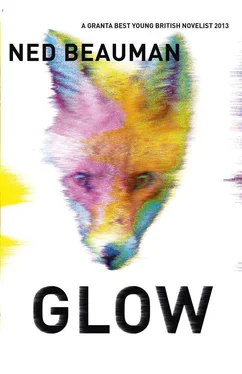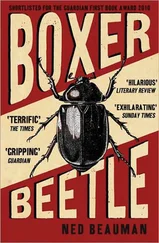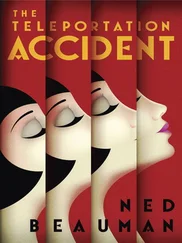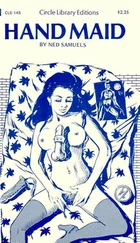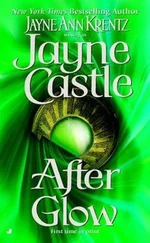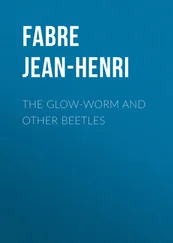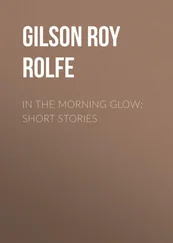2.12 a.m.
When Barky does arrive he still wears flecks of shaving foam on both ear lobes like little pearl studs, so maybe, like Raf, he got out of bed only a short while ago. In his wallet there are three more wontons wrapped up in a shred of orange supermarket bag, one dose of glow for each of them. About half an hour after Raf took that previous compound, he started to feel a change, but so weakly that he wasn’t even sure, like when you go into a room and you think you can feel a cold draught but no windows are open and it might just be your imagination. Then it was gone again. So he’s excited about trying Barky’s novelty, and he’s about to swallow some and get back up on the dryer when he feels a touch on his arm. He turns.
It’s that same girl.
She leans to talk into his ear and he watches a soft shine skate across the film of sweat on her clavicle.
‘What is that?’ she says, which is a lot better than the expected ‘Why were you staring at me like a psycho before?’ She must have seen him take the wonton from Barky.
‘Glow,’ he says.
‘Is your friend selling it?’ She has an American accent.
‘No.’ But there’s no way Raf is going to leave it at that. He’s had girls flirt with him just for drugs before, of course, and maybe that’s what she’s doing, but in that case she doesn’t know the rules, because there’s no empty smile, no hand alighting provisionally on the small of his back. Plus, what if she is? He once slept with an Icelandic girl he met like that at a party. So he hopes he’s not being a total dupe when he says, ‘Do you want some?’
Now she does smile. ‘No, that’s OK.’
But he takes her hand and presses the wonton into it. ‘I’ve heard this stuff is amazing.’
‘What?’
Should he suggest they go outside so they can hear each other? No, not yet. ‘What’s your name?’
‘Cherish,’ she says, or that’s what it sounds like. Is that a name? ‘What’s yours?’
‘Raf.’
‘Do you have any water?’
‘Just a second.’ He turns to Isaac, but he doesn’t have the bottle any more, and Barky doesn’t have one either. Raf thought he saw a half-empty lemonade up on one of the washing machines, but he can’t see it now. And when he turns back, the girl has vanished again, like the ambiguous chill of the pedigree psychotropic. He asks Isaac and Barky where she went, but neither of them were watching. And Barky doesn’t have any more glow to spare.
5.37 a.m.
Raf stumbles out of the laundrette to find himself engulfed in flowers. It’s as if some phenomenological anode inside him has been swapped with its cathode, so that every sensation is replaced by another of exactly inverse quality and equal intensity: petals for skin, perfume for sweat, cold for heat, silence for noise, anthocyanins for disco lights. Only after a moment does he realise that on Saturdays there’s a flower market on this road, so they’re unloading the tulips and daffodils — and sure enough, just at that moment the silence is broken by the trundling of a steel trolley as it comes down a ramp behind him. He breathes in deeply and then walks on down the road to the bus stop where he can catch his night bus.
Isaac and Barky have already left the rave. For a while, they said they weren’t feeling anything from the glow, and Barky also had a gram of ethylbuphedrone, so they all resorted to dabbing some on their gums, which always reminds Raf of rubbing salt and pepper into a flank steak. But then straight after that, too soon for it to be the ethylbuphedrone, the other two had run out into the yard and started vomiting ballistically over the concrete. Between spasms, Barky said the glow they’d taken must have been fake. It occurred to Raf that if he hadn’t even heard of glow until tonight, and yet some opportunist was already selling a fake version, he must be badly behind the times. And then he realised with horror that somewhere the American girl was probably throwing up too because of drugs he’d pushed on her, and she only had about half Barky’s body mass, so a poison could kick her twice as far. Even if he ever found Cherish again, she’d never want to speak to him.
Now, coming down from the ethylbuphedrone, Raf just feels bleached and fidgety, and he decides he probably didn’t have a chance with her anyway. When the bus finally arrives, its windows are bright like a goods vehicle hauling not flowers to market but bulk photons. He gets on, nods to the driver, beeps his Oyster card, and climbs the spiral staircase up to the top deck. What he sees there startles him so much that he forgets to hold on to the vertical handrail, so when the bus halts at a junction he nearly topples forward.
A fox sits there, about six rows back. Every hair in its orange coat burns with a separate flame, and the reflection of a street light outside the window is curled up inside each of its round black eyes like a pale girl in a spin-dryer. Raf has never noticed before that the white fur of a fox’s snout and belly is sprinkled over its eyes, too, to make two oversized brows, and as it considers him this one wears an expression of detached scientific interest. The animal couldn’t have got past the driver, he thinks, so it must have jumped on at the exit doors when someone got off. As the bus accelerates again, he sits down, and the fox turns from him to look out of the window. A scent reaches Raf’s nose, muddy and petroleous, a savage hydrocarbon with no derivatives. No other passengers get on, and when the automatic loudspeaker announces in her broken diction that they’ve arrived at Camberwell Green, the fox jumps to the floor and trots downstairs to disembark.
6.20 a.m.
For the first six months that he lived in his current flat, Raf honestly believed that the corner shop at the end of his street was run by one Iranian guy who worked twenty-two or twenty-three hours a day. He’s been in there at every time there is, and it’s always the same face at the till just like it’s always football playing on the TV fixed to the wall over the wine gums. Raf did introduce himself once, but the next time he went in the guy didn’t even acknowledge their new familiarity. Then about a week later he glanced inside on his way past and he saw both owners arguing about something. Like a twist from a bad murder mystery, they were twin brothers. Today, Raf buys three bananas and a carton of orange juice, enjoying the careful, almost clerical way the guy at the counter wets the tip of his middle finger on a soggy foam pad like a prosthetic gland to help peel open the plastic bag; and then Raf walks down to his block of flats, where an old stained mattress leans against the wall by the entrance, ready for rubbish collection the following week. The number of mattresses people leave out here every month seems wildly out of proportion to the human capacity of the building, like the waste product of some secret industrial process.
Even if it weren’t for the drugs, he knows he wouldn’t be able to sleep for another nine or ten hours, but he’s so worn out that he gets into bed for a while anyway. The heavy black curtains are still closed from when he got up around eleven, so the room is in total darkness except for the red LED on his stereo, and around him are all the paraphernalia of his malady: eyemask, acoustic earmuffs, white noise machine, and about two dozen soiled earplugs scattered under the bed like the droppings of a hamster that eats only packaging foam.
The name of Raf’s condition is non-24-hour sleep/wake syndrome. He was sixteen when he started to notice that his sleep patterns were even more fucked up than the average teenager’s, but it took four different doctors before he got his diagnosis. In a healthy brain, your eyes tell your hypothalamus when it gets dark and when it gets light, your hypothalamus tells your pineal gland when to secrete melatonin, and the melatonin makes you fall asleep at about the same time every day. The normal human circadian rhythm is set at twenty-four hours to match one full rotation of the earth. But Raf’s is set at about twenty-five hours. It’s like his brain is wearing a novelty watch.
Читать дальше
